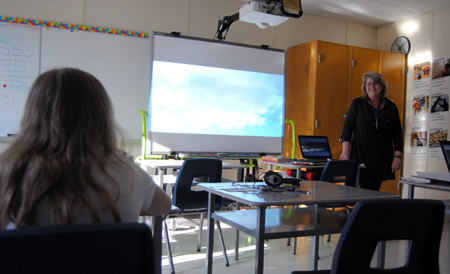February 2014
A program created through a partnership between the Halton District School Board, the Halton Catholic board and Halton Healthcare Services successfully provides students intensive mental health and academic support.
Called Recovery Through Education of Adolescent and Children in Halton (REACH), it provides intensive mental health treatment and education services in a high school to prevent hospitalization and/or to support students as they transition from inpatient services into a community setting.
The 6-to-8 week out-patient program serves a select number of students who are referred to the program through the medical and social work communities. Throughout the day, students receive mental health support from a child youth worker, a social worker and a psychiatrist. In between the group and individual therapy sessions, educators provide support and instruction to students to ensure they continue with their course work.
There are currently two REACH programs operating in Halton – Robert Bateman High School and Garth Webb Secondary School. These programs have a full-time HDSB teacher and a child and youth counsellor; the Robert Bateman program also has an Educational Assistant.
A key component to REACH is that it provides students a safe environment to learn, said Claire Ailey, A key component to REACH is that it provides students a safe environment to learn, said Claire Ailey, Principal of Care and Treatment Programs (Section 23) for the Halton District School Board.
"The ability the teams have to provide outstanding health care and quality education in a safe place is the indispensable feature of the program’s success,” she said. “Mental health problems have a variety of causes and take a variety of forms. Their treatment may involve several types of intervention and support, which need to be delivered in an integrated and carefully coordinated way.”
REACH teacher Doug Wilson says the program gives students confidence to complete their studies.
“Students can be themselves and know they will be supported in many ways,” he explained. “It allows students who have been away from school to integrate into school in a controlled and protected environment. Since academics are self-paced, students don’t feel they are ever losing ground while the format also allows students to reach ahead when they feel prepared.”
There are three key components to instructional days at REACH. The first component involves students, as a group, discussing topics related to overall health such as stress reduction, coping strategies, sleep strategies, goal setting and diet. Students gain confidence and build relationships.
“This time is essential as students realize they’re not alone when facing their mental health challenges,” said Ailey.
The second component involves staff connecting with a student’s home school. The teacher helps keep the student up-to-date with course work so they are best prepared when they return to school.
The final component involves physical activity such as fitness training at the local YMCA, yoga, walking, and gardening.
“There is a strong connection between being outdoors and positive mental health,” said Wilson.
A Grade 11 student said REACH has been very valuable for him. He feels more motivated and focused to tackle his studies due to the structure of the program.
“I love that REACH is a very accepting program and judgment-free,” he said. “You don’t have to worry about what others think of you. You should be able to express yourself as you wish.”
The Halton District School Board has made addressing mental health a high priority. This includes the Board’s new Mental Health strategy as well as the creation of a central database of mental health support systems for students, families to access called, Pathway To Care.
“We would like parents to know there is a range of options for students who struggle with mental health challenges, and it is possible to receive medical support and academic support at the same time,” Wilson said.